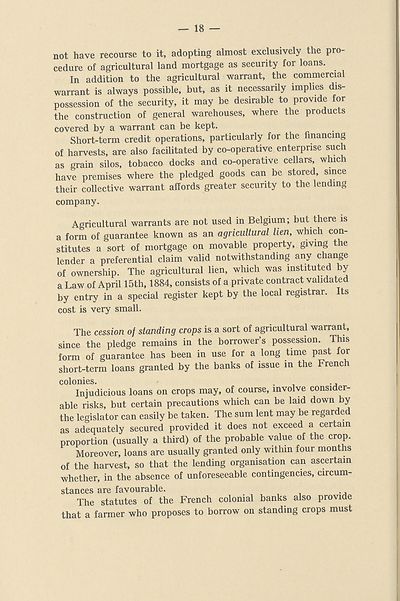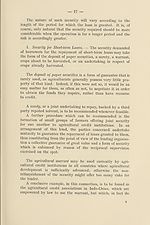Download files
Complete book:
Individual page:
Thumbnail gallery: Grid view | List view

— 18 —
not have recourse to it, adopting almost exclusively the pro¬
cedure of agricultural land mortgage as security for loans.
In addition to the agricultural warrant, the commercial
warrant is always possible, but, as it necessarily implies dis¬
possession of the security, it may be desirable to provide for
the construction of general warehouses, where the products
covered by a warrant can be kept.
Short-term credit operations, particularly for the financing
of harvests, are also facilitated by co-operative enterprise such
as grain silos, tobacco docks and co-operative cellars, which
have premises where the pledged goods can be stored, since
their collective warrant affords greater security to the lending
company.
Agricultural warrants are not used in Belgium; but there is
a form of guarantee known as an agricultural lien, which con¬
stitutes a sort of mortgage on movable property, giving the
lender a preferential claim valid notwithstanding any change
of ownership. The agricultural lien, which was instituted by
a Law of April 15th, 1884, consists of a private contract validated
by entry in a special register kept by the local registrar. Its
cost is very small.
The cession of standing crops is a sort of agricultural warrant,
since the pledge remains in the borrower’s possession. This
form of guarantee has been in use for a long time past for
short-term loans granted by the banks of issue in the French
colonies. > . .,
Injudicious loans on crops may, of course, involve consider¬
able risks, but certain precautions which can be laid down by
the legislator can easily be taken. The sum lent may be regarded
as adequately secured provided it does not exceed a certain
proportion (usually a third) of the probable value of the crop.
Moreover, loans are usually granted only within four months
of the harvest, so that the lending organisation can ascertain
whether, in the absence of unforeseeable contingencies, circum¬
stances are favourable.
The statutes of the French colonial banks also provide
that a farmer who proposes to borrow on standing crops must
not have recourse to it, adopting almost exclusively the pro¬
cedure of agricultural land mortgage as security for loans.
In addition to the agricultural warrant, the commercial
warrant is always possible, but, as it necessarily implies dis¬
possession of the security, it may be desirable to provide for
the construction of general warehouses, where the products
covered by a warrant can be kept.
Short-term credit operations, particularly for the financing
of harvests, are also facilitated by co-operative enterprise such
as grain silos, tobacco docks and co-operative cellars, which
have premises where the pledged goods can be stored, since
their collective warrant affords greater security to the lending
company.
Agricultural warrants are not used in Belgium; but there is
a form of guarantee known as an agricultural lien, which con¬
stitutes a sort of mortgage on movable property, giving the
lender a preferential claim valid notwithstanding any change
of ownership. The agricultural lien, which was instituted by
a Law of April 15th, 1884, consists of a private contract validated
by entry in a special register kept by the local registrar. Its
cost is very small.
The cession of standing crops is a sort of agricultural warrant,
since the pledge remains in the borrower’s possession. This
form of guarantee has been in use for a long time past for
short-term loans granted by the banks of issue in the French
colonies. > . .,
Injudicious loans on crops may, of course, involve consider¬
able risks, but certain precautions which can be laid down by
the legislator can easily be taken. The sum lent may be regarded
as adequately secured provided it does not exceed a certain
proportion (usually a third) of the probable value of the crop.
Moreover, loans are usually granted only within four months
of the harvest, so that the lending organisation can ascertain
whether, in the absence of unforeseeable contingencies, circum¬
stances are favourable.
The statutes of the French colonial banks also provide
that a farmer who proposes to borrow on standing crops must
Set display mode to:
![]() Universal Viewer |
Universal Viewer | ![]() Mirador |
Large image | Transcription
Mirador |
Large image | Transcription
Images and transcriptions on this page, including medium image downloads, may be used under the Creative Commons Attribution 4.0 International Licence unless otherwise stated. ![]()
| League of Nations > Economic and financial section > Report on systems of Agricultural credit and insurance > (28) |
|---|
| Permanent URL | https://digital.nls.uk/190543598 |
|---|
| Shelfmark | LN.II |
|---|
| Description | Over 1,200 documents from the non-political organs of the League of Nations that dealt with health, disarmament, economic and financial matters for the duration of the League (1919-1945). Also online are statistical bulletins, essential facts, and an overview of the League by the first Secretary General, Sir Eric Drummond. These items are part of the Official Publications collection at the National Library of Scotland. |
|---|---|
| Additional NLS resources: |
|

